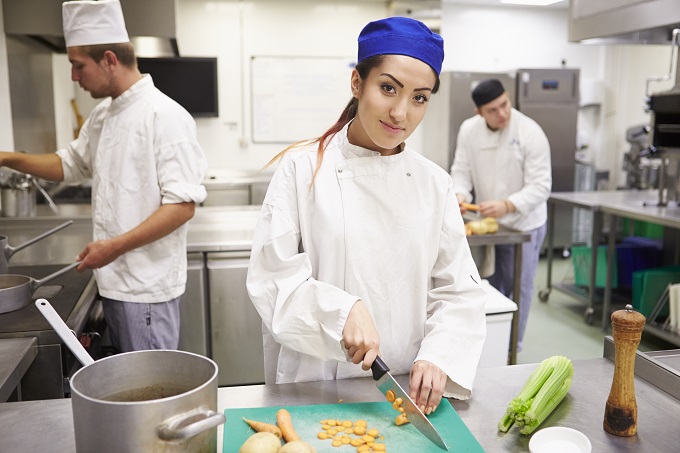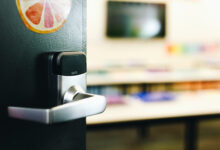Food practice: possibilities for social and vocational development

A fascinating ethnographic study undertaken with teachers and 16 to 18-year-old students around New Zealand found that ‘food rituals’ are a staple in our schools.
Gifting food, ritualised sharing, and ‘the lunch walk’
These were the core rituals that researchers, Eva Neely, Mat Walton and Christine Stephens, identified in their Health Education study. Each ritual highlights the role of food as a surprisingly sophisticated tool for social development in school settings.
This is a feature article from our Term 3 issue of School News. Check out the full edition online now (or pick up your staffroom copy!).
When ‘gifting’, students present food to each other to signal and cement friendship boundaries by making a public gesture that excludes others and generates attention. Cake is a common feature in this ritual, according to the study. The researchers noted in their observations: “Young people could use minimal financial resources to mediate their feelings and friendship to others. Gifting cake was also a way of representing one’s own skills and care for one’s friends publicly. The pride associated with the baked goods was an important aspect of the ritual.”
‘Ritualised sharing’ was correlated with social networking. The study found that “students who were sharing with acquaintances appeared to be those who had a larger friendship circle, made friends quite easily, and also fluctuated with whom they spent most of their time.” Offering food to a new student was considered an invitation to join the conversation, group, or become friends.
Students frequently engaged in planned ‘lunch walks’, researchers observed. “The ritualised lunch walk was a way of establishing, maintaining, and strengthening relationships through the shared purpose of food purchasing. Not every lunch walk participant was required to purchase; instead, the act of joining in appeared to be the key mechanism by which the ritual functioned as a bonding practice.”
The curriculum focus on food focuses on nutrition, but food has much broader implications for social wellbeing that schools could capitalise on. As a practice, making food is deeply connected to how people form and maintain relationships. As a subject choice, food technology is an opportunity for schools to engage learners in a much more community-centred and inquiry-based learning practice.
Learning to cook as self-care
Who else learned to cook a few new recipes during lockdown? The limitations on supermarket visits and household budgets sparked a micro-industry of web tutorials teaching people how to cook properly using basic, cheap, long-lasting, ingredients. Why did it take a global pandemic for so many people to learn the basics?
Re-thinking cookery as a practice, rather than a necessity or simply a vocational pathway is critical for wellbeing. Humans have honed the practice of cooking over thousands of years; it is a practice that children can begin in school and at home and continue to learn throughout their lives. The classroom kitchen, or food technology facility, can be approached in this way as a space to provide students with access to tools and effective training to use those tools so they can develop their own unique practice of cooking, which they will hone and take with them throughout their lives. A form of ritual, preparing food for community or whanau for fun or part of a project, builds a sense of self-confidence and cultural responsibility, but also helps strengthen relationships and build social currency. Learning to cook is a process of learning to care for oneself and others.
Commercial kitchen, classroom tools
The size of your school kitchen will depend on class-size, but classroom kitchen spaces should always be separate from areas where contamination may take place, such as a science classroom. The Ministry of Education’s guidance material for food technology indicates that any food tech space must include hand-washing facilities, separate dishwashing facilities, non-porous workbenches or tables, adequate lighting and ventilation, cleaning agents, and rubbish disposal facilities.
Choosing high quality commercial-grade kitchen appliances will help your facility cope better with high-use and provide more opportunities for students to practice industry-level vocational skills. Safety is paramount and teachers new to food technology should check out the Ministry of Primary Industries’ website to brush up on current legislative expectations. Safety requirements for all equipment, including small appliances like eggbeaters, should be demonstrated to students before they have a go themselves; so always discuss these requirements with your chosen supplier when you purchase new items. Importantly, a registered electrician or gasfitter must install electric or gas stoves, and a certificate of compliance must
be obtained from that tradesperson on completion. If you would like to upgrade or install a specialist food technology learning space, we recommend exploring specialist suppliers who have worked with schools before.
There is absolutely no reason why any teenager in 2020 should be able to utter the phrase, ‘I can’t cook’. Developing a high-quality cookery program at your school can benefit learners in all aspects of their lives.









